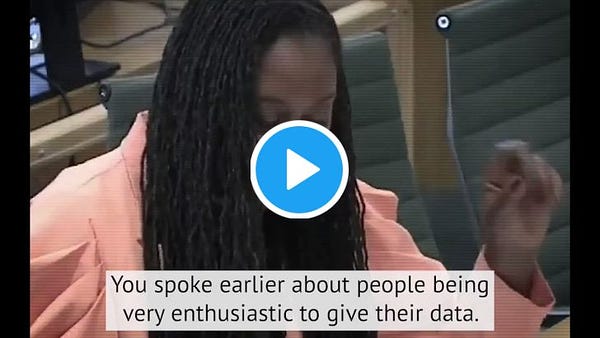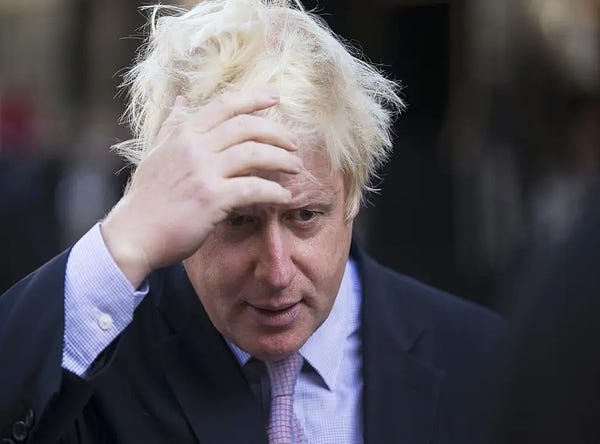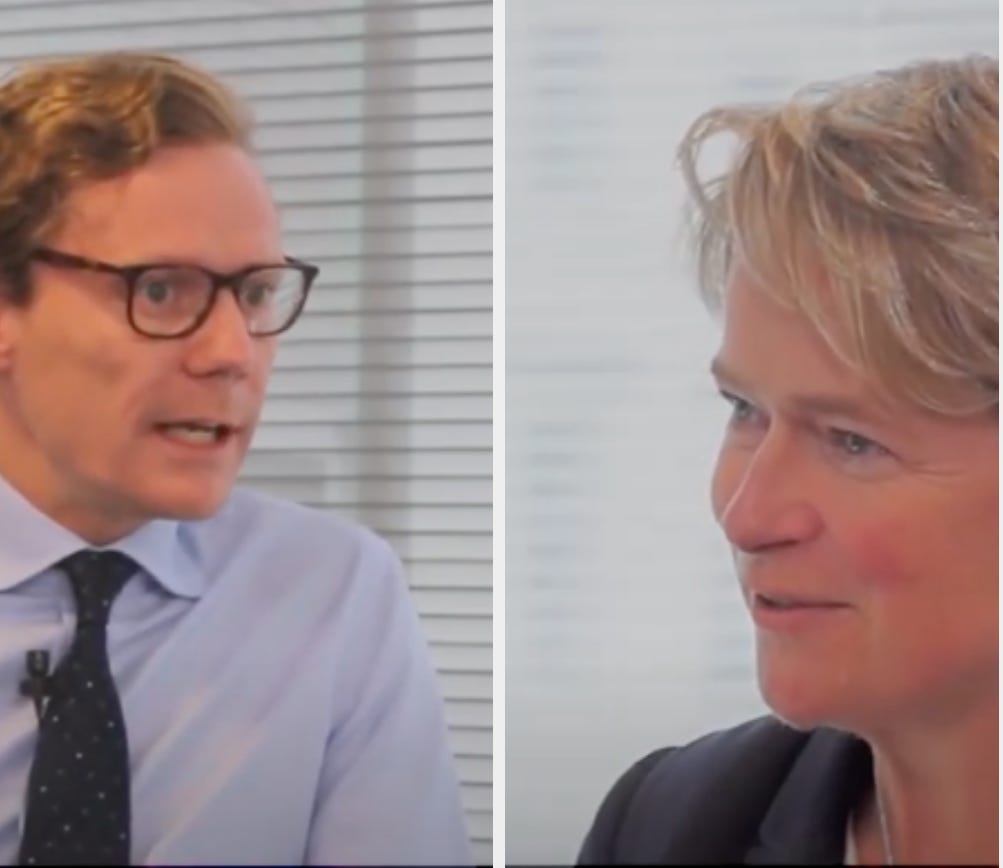When Dido Met Alex
When the man behind a data scandal met the woman behind a data breach on the eve of a data heist
Welcome to Keeping the Receipts— a newsletter from the Citizens, written this week by Carole Cadwalladr. You can read about the mission behind this here.
If you like what you see, consider forwarding it to a friend or two. You can also click the button below to subscribe. And if you’ve been reading it for free, please consider signing up to the paid version.
This newsletter begins with a vote of thanks to former Cambridge Analytica CEO, Alexander Nix. Explaining why personal data matters, why it’s such a valuable commodity to big corporations and why the government’s recently revealed plans for our NHS health records are so alarming, is an ongoing challenge. A mini media storm kicked off over the past two weeks but most people still don’t know anything about it. And most people don’t care.
Or at least, they don’t know enough to care. They don’t realise what it might mean for private companies to have access to our most intimate health data. Or what someone could do with knowledge of, say, your mental health history or birth-control methods or alcohol consumption or prescriptions for anti-depressants or thrush cream, or any number of potentially embarrassing or at least private conditions. Or what it might mean to you to have that information leaked across the internet.
Which is why it was a special gift to have a video surface last week in which the ex-CEO of Cambridge Analytica explained the fundamental principles of UK data law to the ex-CEO of TalkTalk who was at the helm when it was hit by a record-breaking data breach and who is now being touted as the next head of the NHS.
The interview conducted in February 2018, a month before the Cambridge Analytica–Facebook scandal erupted, is a remarkable piece of footage. Two protagonists of two data scandals talking about the implications of sharing personal data, surfacing on the eve of a transfer of 55 million peoples’ health data to a centralised database for commercial exploitation.
Here they are chatting about data ethics and what could happen if, say, some sort of bad actor got hold of this data.
But it was this quote, in particular, which went to the heart of what is happening now:
“Countries such as the UK are what is known as an opt-in data environment so people have to give their consent for the data to be used in these types of programmes.” Alexander Nix, former CEO Cambridge Analytica
How is it possible that Alexander Nix knows this, yet the government doesn’t? Or at least the government has decided to completely ignore this fundamental principle at the heart of our data protection regime in its haste to extract 55 million people’s GP records, put them into a central database and open it up to commercial partners. All without our consent or even knowledge.
The government, of course, does know this. Just as it must know this is unlawful. And in the face of the legal challenge we launched last week with five partner organisations and data rights agency Foxglove, and dissent from professional bodies including the Royal College of GPs and the BMA, it announced a “pause” in its plans on Wednesday.
It was big news. The 1 July deadline to start the transfer of files has been delayed until September. But it is just a pause. The danger is very far from over. A massive chunk of the government’s post-Brexit industrial strategy – a whole new life sciences sector – depends upon access to this data and we have just two months to ensure that this data collection is done with the full, informed consent of patients and that stringent safeguards are put on its use and security.
To help us ensure that this happens, please subscribe to this newsletter if you can. Your support is hugely important in this fight.
And again…
Fast forward two days and this week brought another jaw-dropping Cambridge Analytica moment, this one courtesy of Dawn Butler, the Labour MP for Brent.
It was Matt Hancock’s turn in the hot seat in front of a joint hearing of the Commons Health and Science committees and Dawn Butler’s question was in reference to the NHS COVID-19 data store which he, as the Secretary of State for Health and Social Care, has overseen.
Two private companies have NHS contracts connected to this: Palantir, owned by Peter Thiel, a Silicon Valley investor who sits on the board of Facebook and was an influential supporter of Donald Trump. And Faculty, a company which did the data modelling for Vote Leave and is owned by Marc Warner, a friend of Dominic Cummings who, along with his brother, you may remember was cited once, twice or 24 times in Cummings’s recent testimony.
This is what Dawn Butler asked:
“Are you aware that Faculty and Palantir have links to the discredited Cambridge Analytica?”
And this is what Matt Hancock replied:
“Um. I’m not, um. I don’t think I’m aware of that, no.”
Read the thread to see why we think this is so preposterous:


The Ongoing Saga of the Missing Data
With so-called “Freedom Day” hanging in the balance after it was revealed this week that the Delta variant now accounts for more than 90% of cases and is 60% more transmissible than the Alpha (Kent) variant, we find ourselves at another tipping point in this pandemic.
And yet the government is still refusing to release vital data.
We’ve been banging on about the lack of schools data for the last two weeks. And we’re going to keep banging on about it, because the latest figures from Public Health England show that infection rates are highest among school-age children, with positivity rates appearing to double in some age groups over a single week.
And yet, despite mounting pressure from schools, unions and scientists, PHE has yet to publish data on the actual number of cases associated with outbreaks in schools.
We think this is not just a scandal but a life-endangering one. It’s why we sent the government a pre-action letter with the help of data rights agency AWO and Deepti Gurdasani, a senior lecturer in machine learning at Queen Mary University who’s been such a powerful advocate on the issue. We’ve written again to the government this week and here we got Deepti to explain exactly why she believes it’s so important.
You've supported our campaign to get the government to release full data on the spread of the Delta variant in schools. Why is this so important?
Deepti Gurdasani: On 17 May the government made a decision to remove the recommendation of masks in schools. It claimed that it was following the data, not the dates. This was challenged by Independent Sage, numerous experts and went against the advice of SAGE at the time.
One of the questions put to the government was, “What are the numbers of cases linked to school outbreaks of the Delta variant?” Unfortunately, this data hasn’t been released to date.
Last week Public Health England reported that there had been 140 outbreaks of the Delta variant in schools since it came into the UK, but this doesn’t tell us the scale of the problem. We know that an outbreak is essentially two or more children affected in a school. It could be two children, it could be 50 children, it could be 100 children.
If the government is claiming that it’s following data, then at the very least that data needs to be made available so it can be scrutinised by the public and by scientists.
What are the consequences if we continue to ignore the evidence of rising cases in schools?
Deepti Gurdasani: I hear from many people now that rising cases in children and even in the wider community don’t matter because of vaccination. While we know that the link between cases and hospitalisations is weakened, because 40% of our population is fully vaccinated, this link hasn’t been broken yet. And it’s very clear from the data that we see coming out from the Northwest, for example, showing not just an exponential rise in cases but also a rapid rise in hospitalisations.
And hospitalisation is not the only consequence. We know that 7% – 8% of children develop symptoms that last for 12 weeks or more and there are suggestions from other countries, such as Singapore, that these [new] variants may affect children more, so we need to be very cautious.
We also need to remember we have a large unprotected population, we have a new variant that significantly escapes vaccines, which means one dose is not as effective as it would have been before.
As an epidemiologist, how does it make you feel to be discussing the possibility of a third wave this summer?
Deepti Gurdasani: I feel very frustrated that we're talking about entering a third wave at a point in time where we’re 16 months into this pandemic and have had three lockdowns already, all related to late action on containing transmission. If we look at SAGE documents from 13 May, the government was told very, very clearly that we were in for a third wave if this variant was substantially more transmissible, which it is – a wave that would reach the January peak and possibly exceed it. But despite knowing this, the government has gone ahead with reopening on 17 May. And we’re still having discussions about 21 June despite the fact that we had more than 7,000 cases yesterday, an exponential spread and increasing hospitalisations. Our government is still waiting to see what happens, which is a critical mistake that it’s made three times now but doesn’t seem to have learned anything from.
The Receipts
It’s been a busy week for our Receipt Keepers, but not so busy that they didn’t have time to compile this mega Twitter thread, setting out all of the times in recent months that government ministers were found to have acted unlawfully, broken the ministerial code or misled parliament.


That’s it for today. If you’re able to spare £6 a month to subscribe and help us continue this work, we’d be grateful. Many thanks, Carole x
PS You may have spotted Dawn Butler waving a book at Matt Hancock called The Little Black Book of Data and Democracy. It’s by Kyle Taylor, a key member of the team behind another Citizens project, the Real Facebook Oversight Board. Order it here.




